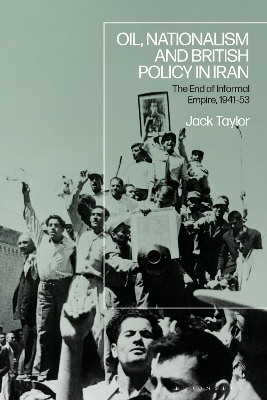
Oil, Nationalism and British Policy in Iran
The End of Informal Empire, 1941-53
Seiten
2024
Bloomsbury Academic (Verlag)
978-1-350-32058-1 (ISBN)
Bloomsbury Academic (Verlag)
978-1-350-32058-1 (ISBN)
As new nations were formed from the declining British Empire, a murky world of diplomats, oil executives and spies were determined to maintain London’s grip on Iran and its strategic oil reserves. Directed from Whitehall by successive governments, this book explores the complexities and ambiguities of British policy in Iran and demonstrates its centrality to post-war imperial reorientation.
Situating Iran within Britain’s ‘informal empire,’ Jack Taylor demonstrates that Clement Attlee’s Labour Government saw Iranian oil as critical to the construction of a domestic New Jerusalem, and used coercion, propaganda, and espionage to preserve their control over it. In doing so, they were forced to confront not only the emerging Cold War, but local resistance expressed through diverse forms including trade unionism, Soviet-inspired Marxism, and popular nationalism.
Oil, Nationalism and British Policy in Iran offers new insight into the scale of British interference in Iran and its ultimate failure. It reveals that as London’s policy floundered the United States independently took steps to safeguard their own regional economic and security interests. Although British actors were critical in the operation to depose Prime Minister Mohammad Mossadegh following his government’s nationalisation of the oil industry, they were ultimately unable to sustain their informal empire in Iran.
Situating Iran within Britain’s ‘informal empire,’ Jack Taylor demonstrates that Clement Attlee’s Labour Government saw Iranian oil as critical to the construction of a domestic New Jerusalem, and used coercion, propaganda, and espionage to preserve their control over it. In doing so, they were forced to confront not only the emerging Cold War, but local resistance expressed through diverse forms including trade unionism, Soviet-inspired Marxism, and popular nationalism.
Oil, Nationalism and British Policy in Iran offers new insight into the scale of British interference in Iran and its ultimate failure. It reveals that as London’s policy floundered the United States independently took steps to safeguard their own regional economic and security interests. Although British actors were critical in the operation to depose Prime Minister Mohammad Mossadegh following his government’s nationalisation of the oil industry, they were ultimately unable to sustain their informal empire in Iran.
Jack Taylor is an independent researcher and historian with an interest in the intersections between labour movements, decolonisation and post-war British economic policy. He holds a PhD in History from University College London, UK.
Introduction: The Unresolved Coup
1. Iran Under Occupation
2. Labour, Imperialism and Iran
3. Development and Division
4. Welfare Imperialism in Crisis
5. British Responses and British Failures
Epilogue: Reflecting on the End of Empire in Iran
| Erscheinungsdatum | 09.01.2024 |
|---|---|
| Zusatzinfo | 10 bw illus |
| Verlagsort | London |
| Sprache | englisch |
| Maße | 156 x 234 mm |
| Themenwelt | Geschichte ► Allgemeine Geschichte ► Zeitgeschichte |
| Geisteswissenschaften ► Geschichte ► Regional- / Ländergeschichte | |
| Geschichte ► Teilgebiete der Geschichte ► Wirtschaftsgeschichte | |
| Sozialwissenschaften ► Politik / Verwaltung ► Europäische / Internationale Politik | |
| ISBN-10 | 1-350-32058-7 / 1350320587 |
| ISBN-13 | 978-1-350-32058-1 / 9781350320581 |
| Zustand | Neuware |
| Haben Sie eine Frage zum Produkt? |
Mehr entdecken
aus dem Bereich
aus dem Bereich
Gewalt, Umwelt, Identität, Methode
Buch | Softcover (2024)
Spector Books OHG (Verlag)
36,00 €
wie Freud im Kollektiv verschwand
Buch | Hardcover (2024)
Klett-Cotta (Verlag)
25,00 €


